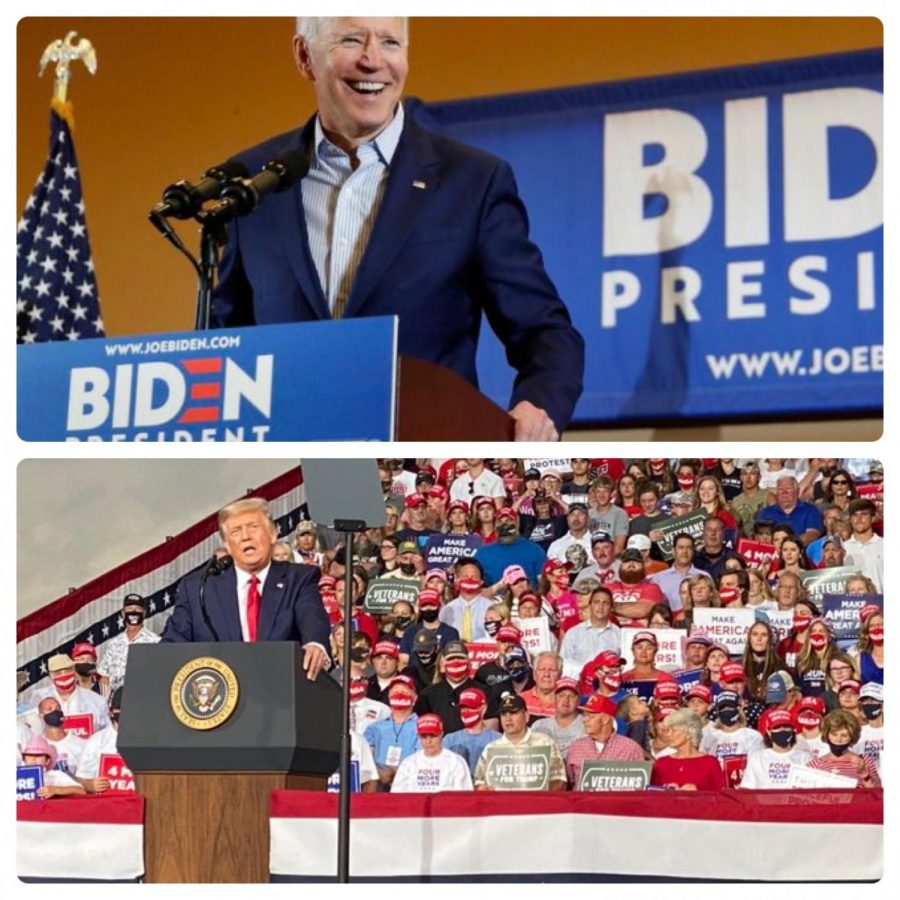Democrats Outshine Republicans in Unconventional Conventions
On the heels of both the Democratic and Republican National Conventions, our nation’s divisions could not be more apparent.
American history books reflect an image of a nation that has seen a great deal of turmoil, although furnished on ideals of liberty and equality. However, if there were ever a moment where America could be said to be going through a crisis, it would be now. Crisis would be selling the issues Americans are presently facing short, as the present crisis does not only test what we were, but tests the very heart and soul of who we are and what we will be as a nation in 2020 and beyond. On the heels of both the Democratic and Republican National Conventions, our nation’s divisions could not be more apparent.
Unconventional is the only term befitting enough to describe both conventions, as the DNC held its first virtual convention with a slew of speakers such as the Obamas and the Clintons. The convention saw California Senator Kamala Harris accept the Democratic nomination for vice president of the United States — making her the first woman of color to do so. Contrarily, the RNC was held in-person for all three days with supporters of President Trump arriving in droves. All four of the president’s adult children, First Lady Melania Trump, Vice President Mike Pence, President Trump himself and others certainly served as lightning rods for headlines. However, one speaker, in particular, who shattered convention was Mike Pompeo, who would administer his speech from Jerusalem, Israel. With approximately three months until the presidential election, it seems that the scene has been set, and the 2020 election has history written all over it.
Not to endorse either party, but the DNC, although held virtually, was not only more compelling because of its notable array of speakers, but more so because of how it captured the very essence of what it means and looks like to be an American in 2020. Although powerful speeches from former President Barack Obama left a lasting impact on audiences, it was the ideal of the American citizen at the center of this election. However, both conventions employed an intriguing repertoire of tactics to try to sway swing voters, and one of those tactics lies in the very nature of how the conventions were conducted. Democratic voters, who are more likely to be voting through the mail, witnessed Joe Biden give perhaps one of his most powerful speeches to an almost empty room, which truly captures Biden’s devotion to mitigating the pandemic. Conversely, President Trump and Vice President Pence would offer their speeches to a lively Republican crowd in Washington, D.C. since conservative voters are more likely to vote in person. On this front, both conventions did a solid job of appealing to their respective bases. Still, in terms of relaying a message to voters about the importance of adhering to necessary protocols to halt COVID-19, the DNC may not have been held the way Americans want; however, it was conducted the way Americans need. As a result, the DNC sends a profound message to both liberal and conservative voters about what needs to be done to control the pandemic while simultaneously showcasing that Biden is willing to lead the charge.
However, the criteria of being compelling far transcends this seemingly baseline aspect, for what Americans truly care about is present in the topics adversely affecting our nation today. Among those pivotal topics are the sordidly ubiquitous issues of racial injustice, COVID-19 and the economy, which lies in disrepair. Where the RNC saw liberal-bashing, condemnation of protests and, bizarrely enough, the prodigious pushing of the QAnon conspiracy by Kimberly Guilfoyle, the DNC seemed less concerned about taking aim at the political opposition and more engaged with aiming for creative solutions to the various health and socio-economic diseases afflicting America. Indeed, the RNC raised several valid points about the rioting, violence and looting by disavowing such actions. Yet it seems that the bulk of the convention backed out of its promise to understand the general American sentiment. While the Republican Party condemned these actions, it did not seem to comprehend or acknowledge why there are protests in the first place. Although Joe Biden condemns such actions, he shows that he can understand, sympathize and empathize with the reasons why peaceful demonstrations are occurring.
Additionally, where the Democrats responded to the COVID-19 pandemic with a sense of urgency and pragmatism, the Republicans approached it as a minute obstacle that hinders our economy. It was almost as if they failed to recognize that there will be no economic recovery if there is no health recovery. Although President Trump promises a vaccine sometime in early November, many Americans cannot shake the thought that the release of a vaccine so close to the election is less about the wellbeing of the people he swore to protect and more about bolstering his reelection campaign.
Although the DNC was more compelling, that does not necessarily mean it was perfect. The reality of holding political conventions during a pandemic saw ratings slide drastically from the almost spectacle-like ratings of 2016. Although speech quality from the Democratic convention was high, it was still muddled by the conspicuous fact that without an audience present, speeches carried significantly less weight than they would have with an active audience. However, the Democrats drove their point home, as they proved that political conventions are not meant to show off a politician’s oratory abilities. They are intended to express the power of the American people. If the Democratic convention proved anything within the days it was held, it proved that perseverance, despite grueling circumstances in America, has not yet been lost.
Noah Osborne, FCRH ’23, is a journalism major from Harlem, N.Y.








































































































































































































